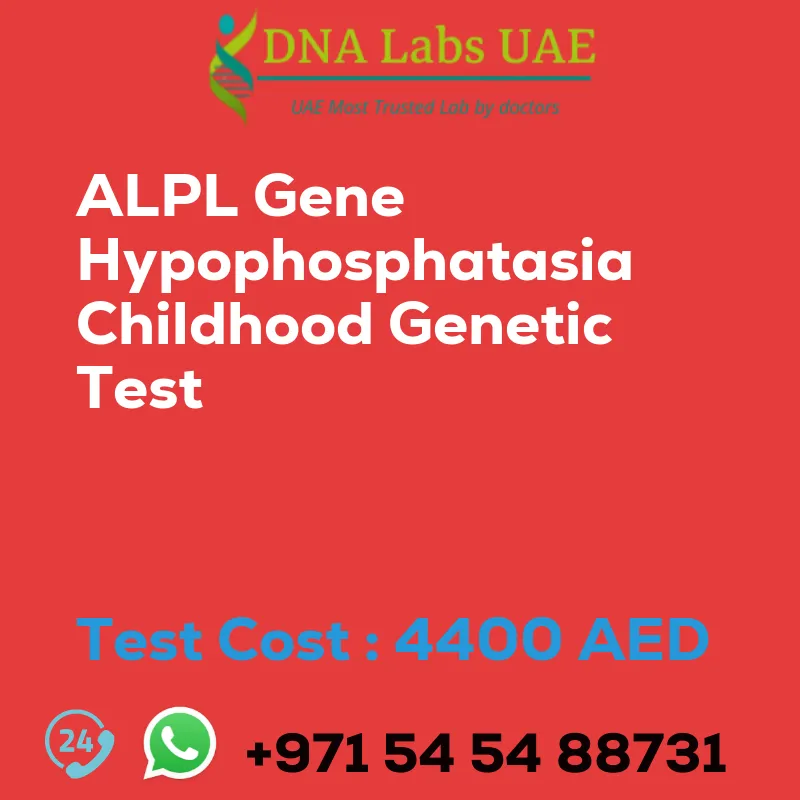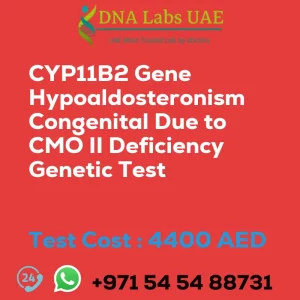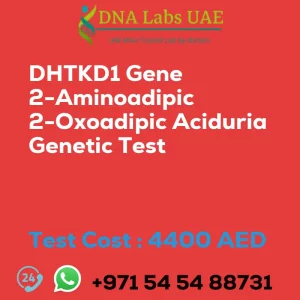ALPL Gene Hypophosphatasia Childhood Genetic Test
Test Name: ALPL Gene Hypophosphatasia Childhood Genetic Test
Components:
- Price: 4400.0 AED
- Sample Condition: Blood or Extracted DNA or One drop Blood on FTA Card
- Report Delivery: 3 to 4 Weeks
- Method: NGS Technology
- Test Type: Metabolic Disorders
- Doctor: General Physician
- Test Department: Genetics
Pre Test Information:
Clinical History of Patient who is going for ALPL Gene Hypophosphatasia, childhood NGS Genetic DNA Test. A Genetic Counselling session to draw a pedigree chart of family members affected with Hypophosphatasia, childhood.
Test Details:
ALPL gene hypophosphatasia is a rare genetic disorder characterized by defective bone mineralization. It is caused by mutations in the ALPL gene, which provides instructions for producing an enzyme called tissue non-specific alkaline phosphatase (TNSALP). This enzyme is involved in the metabolism of minerals such as calcium and phosphate, which are essential for bone mineralization.
Children with hypophosphatasia may present with symptoms such as weak or soft bones, fractures, delayed or impaired tooth development, muscle weakness, and growth retardation. The severity of the condition can vary, with some individuals experiencing life-threatening complications.
NGS (Next-Generation Sequencing) genetic testing is a method used to identify mutations in the ALPL gene. This test involves sequencing the entire ALPL gene to detect any changes or abnormalities in the DNA sequence. NGS technology allows for the analysis of multiple genes simultaneously, making it a useful tool for diagnosing genetic disorders like hypophosphatasia.
By identifying the specific mutation in the ALPL gene, NGS genetic testing can confirm the diagnosis of hypophosphatasia and provide information about the severity and prognosis of the condition. It can also help with genetic counseling and family planning by identifying if other family members are carriers of the mutation.
It is important to note that NGS genetic testing for hypophosphatasia is typically performed in specialized genetic testing laboratories and requires a healthcare professional to order the test. The results should be interpreted by a geneticist or genetic counselor who can provide appropriate counseling and guidance based on the findings.
| Test Name | ALPL Gene Hypophosphatasia childhood Genetic Test |
|---|---|
| Components | |
| Price | 4400.0 AED |
| Sample Condition | Blood or Extracted DNA or One drop Blood on FTA Card |
| Report Delivery | 3 to 4 Weeks |
| Method | NGS Technology |
| Test type | Metabolic Disorders |
| Doctor | General Physician |
| Test Department: | Genetics |
| Pre Test Information | Clinical History of Patient who is going for ALPL Gene Hypophosphatasia, childhood NGS Genetic DNA Test A Genetic Counselling session to draw a pedigree chart of family members affected with Hypophosphatasia, childhood |
| Test Details |
ALPL gene hypophosphatasia is a rare genetic disorder characterized by defective bone mineralization. It is caused by mutations in the ALPL gene, which provides instructions for producing an enzyme called tissue non-specific alkaline phosphatase (TNSALP). This enzyme is involved in the metabolism of minerals such as calcium and phosphate, which are essential for bone mineralization. Children with hypophosphatasia may present with symptoms such as weak or soft bones, fractures, delayed or impaired tooth development, muscle weakness, and growth retardation. The severity of the condition can vary, with some individuals experiencing life-threatening complications. NGS (Next-Generation Sequencing) genetic testing is a method used to identify mutations in the ALPL gene. This test involves sequencing the entire ALPL gene to detect any changes or abnormalities in the DNA sequence. NGS technology allows for the analysis of multiple genes simultaneously, making it a useful tool for diagnosing genetic disorders like hypophosphatasia. By identifying the specific mutation in the ALPL gene, NGS genetic testing can confirm the diagnosis of hypophosphatasia and provide information about the severity and prognosis of the condition. It can also help with genetic counseling and family planning by identifying if other family members are carriers of the mutation. It is important to note that NGS genetic testing for hypophosphatasia is typically performed in specialized genetic testing laboratories and requires a healthcare professional to order the test. The results should be interpreted by a geneticist or genetic counselor who can provide appropriate counseling and guidance based on the findings. |








